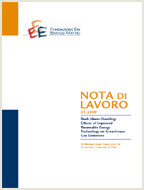Carbon-based Border Tax Adjustments and China’s International Trade: Analysis based on a Dynamic Computable General Equilibrium Model

16.02.2013
Ling Tang, Qin Bao, ZhongXiang Zhang, Shouyang Wang
D58, F18, Q43, Q48, Q52, Q54, Q56, Q58
Border Carbon Tax Adjustments, International Trade, Dynamic Computable General Equilibrium Model, Price Determination Power, Technological Change
Climate Change and Sustainable Development
Carlo Carraro
With large shares in global trade and carbon emissions, China’s international trade is supposed to be significantly affected by the proposed carbon-based border tax adjustments (BTAs). This paper examines the impacts of BTAs imposed by the USA and EU on China’s international trade, based on a multi-sector dynamic computable general equilibrium (CGE) model. The simulation results suggest that BTAs would have a negative impact on China’s international trade in terms of large losses in both exports and imports. As an additional border tariff, BTAs will directly affect China’s exports by cutting down exports price level, whereas Chinese exporting enterprises will accordingly modify their strategies, significantly shifting from exports to domestic markets and from regions with BTAs policies towards other regions without them. Moreover, BTAs will affect China’s total imports and sectoral import through influencing the whole economy in an indirect but more intricate way. Furthermore, the simulation results for coping policies indicate that enhancing China’s power in world price determination and improving energy technology efficiency will effectively help mitigate the damages caused by BTAs.
